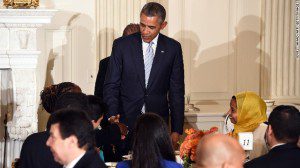Last night, more than 100 Muslims had iftar — or the traditional breaking of the fast — at the White House. This year, there was a concerted effort to boycott the iftaar due to the Obama administration’s policies of surveillance on high-profile Muslim Americans, unequivocal support for Israel despite mass atrocities in Gaza, the continued use of drones in Yemen and Pakistan, and the indefinite detention of prisoners in Guantanamo Bay and Bagram,
Those who attended the controversial White House iftar justified their choices by describing it as necessary in order to engage the President on important issues affecting the Muslim community. As a Muslim woman who assists in representing over twenty detainees in Guantanamo Bay, I implore those who attended last night’s iftar, to not justify their decision to attend in my clients’ names.
Last night, nearly 150 Muslims (149 to be exact) had iftar at Guantanamo Bay. Their iftar was not as ceremonious. For many, this is their 11th Ramadan at Guantanamo. For 11 years, they have been deprived of the community, love and warmth that go hand in hand with Ramadan. Almost all of these men (139) have never been charged with a crime. The majority of them (78 to date) have been cleared for release. These men are on my mind and in my prayers this Ramadan.
While attendees at the White House iftar went through security, I hope they were reminded of the invasive and humiliating genital searches that men in Guantanamo Bay have to go through every time they wish to speak to their families or their lawyers. I hope they were grateful that while security to attend the iftar was tight, it was nothing compared to being frisked in the genitals and the buttocks, oftentimes in a manner that amounts to sexual assault.
While attendees enjoyed the finest food that the White House kitchen has to offer, I hope they thought about the hunger strikers in Guantanamo Bay who are forcibly extracted from their cells and prodded with painful force-feeding tubes at all hours of the day. I hope they thought about men like my client, Yasin Ismail, whose weight fluctuates around 100 pounds. Yasin has sustained severe injuries as a result of the force-feeding procedures. When I saw Yasin a few weeks ago, his body was skeletal and his arms and legs were bruised from the shackles of the force-feeding chair.
While attendees heard the President quote the Quran, I hope they were grateful that they could access their Qurans without any fear of reprisal. Most men in Guantanamo avoid owning or keeping Qurans in their cells because they fear that authorities will disrespect their holy book.
While attendees broke for the sunset prayer, I hope they kept the detainees who are prevented from the communal tarawih prayers in mind. Authorities in Guantanamo punish hunger strikers by preventing them from joining in the special Ramadan prayers that are a staple of this holy month.
I appreciate the White House’s gesture of reaching out to Muslim Americans during Ramadan. But the Obama administration has shown a complete disregard for the religious rights and practices of Muslims in Guantanamo Bay. While President Obama talked about celebrating one of the “great faiths,” the policies he defends in Guantanamo Bay fail to provide detainees the opportunity to meaningfully practice their religion. The disconnect between President Obama’s words and his policies show that while he partakes in the White House tradition of the annual iftar, the concerns of Muslims are not a real priority.
As a human rights activist and a Muslim, I find it deeply insulting that Muslim American leaders have described the White House iftar as an opportunity to meaningfully engage President Obama on issues such as Guantanamo Bay. Did anyone ask President Obama about Adnan Latif? Adnan was a spirited and beloved Yemeni detainee, who was cleared for release multiple times. He was found dead in his cell almost two years ago. There were no disciplinary hearings in response to his death.
Did anyone ask President Obama why Muslims attending the White House dinner could pray communally, but detainees in Guantanamo Bay are denied that right? Did anyone ask President Obama why his Justice Department has continually defended force-feeding, a procedure, which a D.C. Circuit judge described as “a painful, humiliating and degrading process”? I haven’t talked to anyone who attended last night’s iftar, but I have a hunch the answer to these questions is no.
I also haven’t had a chance to talk to our clients about the White House iftar, but I know that they would view a dinner hosted by President Obama in celebration of Muslim Americans as cruelly ironic.
Accountability doesn’t happen over chitchat and hors d’oeuvres at a state dinner. Petty photo opportunities and vapid small talk are not going to provide American Muslims with the political clout they so desperately seek. President Obama could close Guantanamo Bay tomorrow, if he had the moral and political will to do so. Yet, no amount of cajoling from the international community, human rights activists, and legal scholars have convinced our president to soldier past congressional histrionics and end this dark chapter in American history.
I stand with organizations such as the American Anti-Arab Discrimination Committee, which chose not to attend the iftar, declaring, “Political engagement is important and having a seat at the table is crucial — but only when that seat is intended to amplify our voice as a community, not tokenize or subdue it.”
If President Obama wanted to genuinely engage the Muslim community on issues that affect us, he would meet with us away from the press cameras and at the negotiating table. Until he does so, I see no value in attending high publicity events, which celebrate the Muslim American community, whilst the administration silently condones the indefinite detention of 149 Muslim men in Guantanamo.
Tasnim Motala is a current student at Yale Law School. She serves as habeas counsel for approximately 20 detainees in Guantanamo Bay. She is a 2012 graduate of Yale College and also holds a masters degree from the University of Cape Town.













